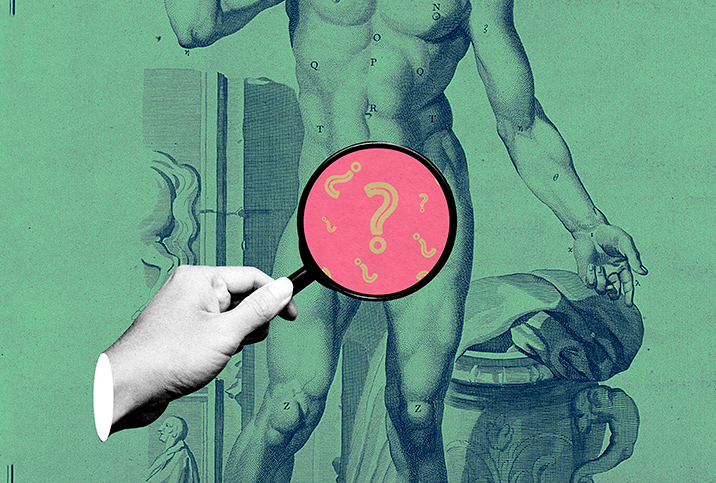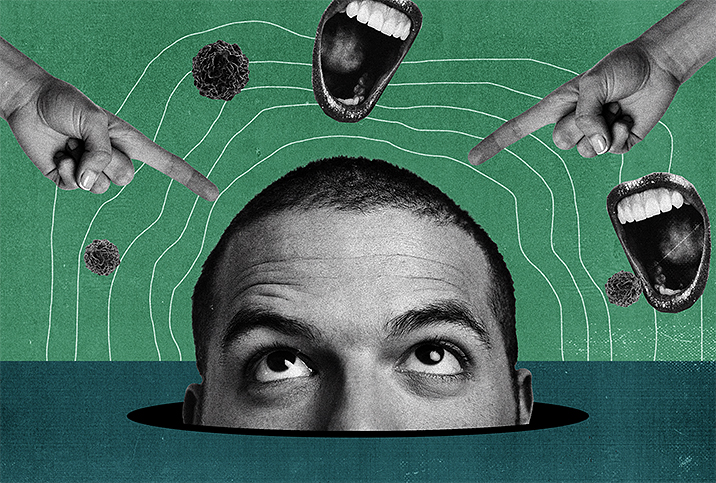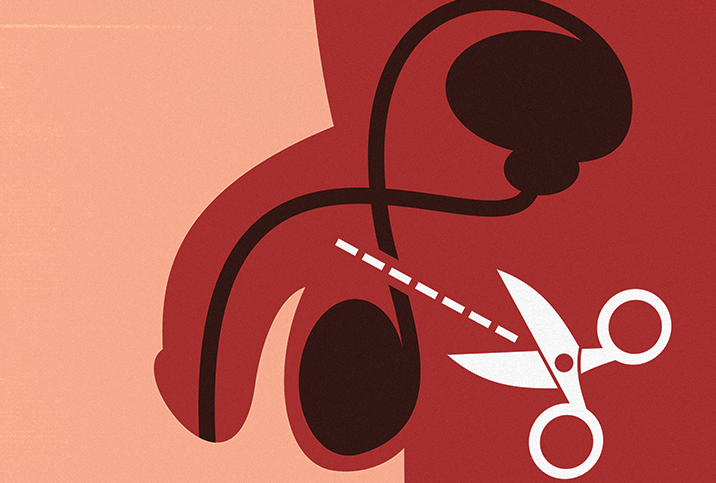Please Stop Believing These Testicle Health Inaccuracies

Most men know a couple of things about testicles. One, they are important parts of the male reproductive system because they have something to do with sperm production. Two, contact with foreign bodies, even a glancing blow, can be excruciating.
After those tidbits, most people's knowledge of their gonads—especially their testicle health—gets fuzzy, and a lot of what they hear regarding testicular disorders may be inaccurate.
So let's dispel some of the false notions regarding the health of your testes and the role they play in your overall wellness.
Inaccuracy #1
Testicles are the primary driver of erectile function—and dysfunction
A primary genital issue of concern for many men is erectile dysfunction (ED), and it's not unreasonable to assume ED might have something to do with testicular health. But that's frequently not the case, according to Charles Welliver, M.D., a urologist in Albany, New York, with subspecialties in male infertility and sexual dysfunction.
"So there's sort of four categories of erectile dysfunction, broadly: vascular, nerve-related, psychogenic and hormonal," he said. "I would say testicular is really only relevant for the hormonal one. I would say maybe 5 percent of ED is testosterone related. It's probably more common in younger guys than older guys."
A common assertion about ED is that it's related to low testosterone. A lot of men may know little about testosterone production other than it has something to do with the testicles. The truth is many cases of ED have little to do with testosterone/testicular issues. ED is more prominently associated with a variety of general health concerns and possible psychological issues.
Inaccuracy #2
Testosterone is all about testicle health
Testosterone levels have to do with a lot more than just the health of your testes. That's why doctors such as Welliver put more emphasis on lifestyle and other contributing factors to general health.
"The things that the testicles do, like testosterone production and fertility, you certainly get people coming in worried about symptoms maybe related to testosterone," Welliver said. "Or [they say,] 'I'm worried that I might be infertile.' That's probably more likely the type of guys that come to the clinic."
From time to time, a 20-year-old man comes to Welliver's office and wants a semen analysis to make sure he's fertile. While it's not unreasonable to seek lab results to better understand your own body, it's misguided to assume testosterone levels always coincide with testicular health specifically.
In fact, testosterone levels can relate more directly to a number of other factors, including genetics, lifestyle choices, illness and injury history, and more.
Inaccuracy #3
All testicular pain has a cause that is easily pinpointed
When pain arises in the scrotal area, it might seem important to identify the specific condition or injury that caused the pain. And, yes, ruling out potential contributing factors also may be important.
Doctors have begun to take less of a "tunnel vision" approach to diagnosing chronic scrotal content pain (CSCP), defined by a study published in the journal Reviews in Urology as "bothersome pain localized to structures within the scrotum that has been present for three or more months."
The idea of CSCP has become increasingly relevant when dealing with health issues in the genital region, according to Katherine Rotker, M.D., a fellowship-trained urologist who specializes in sexual health and male infertility at Yale School of Medicine.
"There was an older approach and thought process to pain in the genital area," she said. "Any pain in the genital area was prostatitis and it was treated with antibiotics. And then we did long-term and multiple courses of antibiotics and didn't necessarily see improvement. Similarly, testicular pain was epididymitis, and antibiotics would come in—maybe more than was needed."
By casting a wider net, urologists have found more success treating conditions involving CSCP without simultaneously overusing medications that could have a detrimental effect, such as antibiotics. It's about dealing with the circumstances of each individual, which might include overlapping diagnoses. That's where this "umbrella category" of chronic scrotal content pain comes into play.
"A lot of testicular pain can be referred," Rotker said. "This can be from issues in the back. This could be from issues in the abdomen, from issues in the kidney. And these can lead to referred pain in the testicle or scrotal area. So if you think about it in terms of just what's in the scrotum, you can miss some of that."
Inaccuracy #4
It's OK to ignore minor (dull) testicle pain
Ignoring pain is a mistake; it is still pain caused by something and coming from somewhere. Doctors are generally going to be upfront about what your options are for treatment. In some cases, solutions might be limited, but talking to a doctor about the type of problem you're having gives you a better idea of your options than the standard "grin and bear it" technique.
"Occasionally, I see a hydrocele or a varicocele or a spermatocele, which are just different anatomical issues in the scrotum," Welliver said. "You know, those are not as common in younger guys; [they] seem to occur more in older guys. So that's another thing we see guys for. Then a lot of the issue then becomes, 'You have this hydrocele. How much does it bother you? Do you want to have surgery for it?' That's kind of the million-dollar question right off the bat."
There are some optimistic and emerging potential treatments for these issues, but it's almost impossible to gain a realistic understanding of those options by using a search engine and a nonmedical educational background.
Inaccuracy #5
Testicular cancer is a death sentence (for your testes)
"Testicular cancer, principally seen in guys 20 to 40, is rarely seen outside of that age group. It's one of the most curable cancers, so that's good news," Welliver said. "The problem is that most of the guys we get are young men who are generally terrible at following up with doctors, going to see doctors and all that stuff."
Some men may be fearful that developing testicular cancer means the loss of one or both testicles. The possibility of losing one is very real, with orchiectomy being the first line of treatment. But the remaining testicle can usually keep a man's sperm count and testosterone level normal, maintaining his fertility and sex drive.
Losing both testes is possible but far less likely. Studies put the number of bilateral testicular cancer cases at 5 percent or less of all testicular cancer cases.
The prospect of an orchiectomy, or even more severe potential consequences, may increase the chances that men will ignore their problems, including signs of testicular cancer, according to Welliver.
"Really, the biggest problem is when guys have testicular cancer and then they try and ignore it for six months," he said. "That's when they really have problems."
Testicular function and health are likely a bit of a mystery to anyone who has not received a formal education on the subject. Even specialists in genital health, sexual function and similar areas are learning new details every day.
So the next time you have testicular pain or questions concerning your testicular health, don't hesitate to ask your urologist or primary care team for proper medical advice. It might be the first step you take in securing a defense against cancer, fertility issues, ED and other health conditions.


















